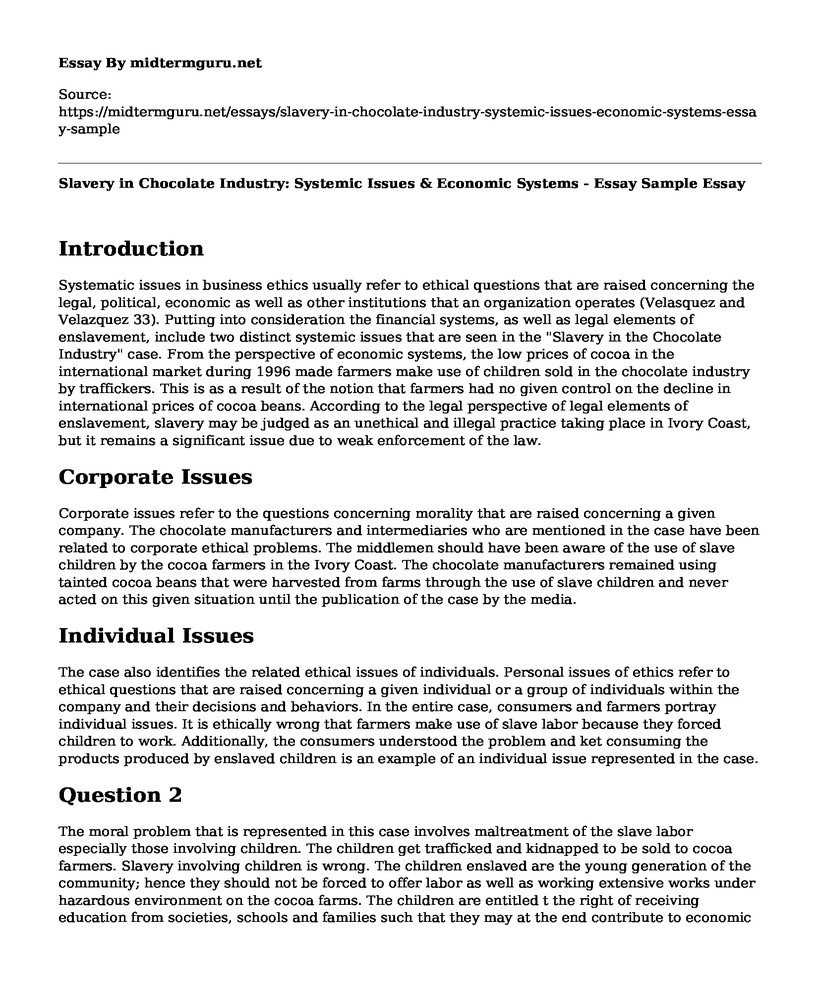Introduction
Systematic issues in business ethics usually refer to ethical questions that are raised concerning the legal, political, economic as well as other institutions that an organization operates (Velasquez and Velazquez 33). Putting into consideration the financial systems, as well as legal elements of enslavement, include two distinct systemic issues that are seen in the "Slavery in the Chocolate Industry" case. From the perspective of economic systems, the low prices of cocoa in the international market during 1996 made farmers make use of children sold in the chocolate industry by traffickers. This is as a result of the notion that farmers had no given control on the decline in international prices of cocoa beans. According to the legal perspective of legal elements of enslavement, slavery may be judged as an unethical and illegal practice taking place in Ivory Coast, but it remains a significant issue due to weak enforcement of the law.
Corporate Issues
Corporate issues refer to the questions concerning morality that are raised concerning a given company. The chocolate manufacturers and intermediaries who are mentioned in the case have been related to corporate ethical problems. The middlemen should have been aware of the use of slave children by the cocoa farmers in the Ivory Coast. The chocolate manufacturers remained using tainted cocoa beans that were harvested from farms through the use of slave children and never acted on this given situation until the publication of the case by the media.
Individual Issues
The case also identifies the related ethical issues of individuals. Personal issues of ethics refer to ethical questions that are raised concerning a given individual or a group of individuals within the company and their decisions and behaviors. In the entire case, consumers and farmers portray individual issues. It is ethically wrong that farmers make use of slave labor because they forced children to work. Additionally, the consumers understood the problem and ket consuming the products produced by enslaved children is an example of an individual issue represented in the case.
Question 2
The moral problem that is represented in this case involves maltreatment of the slave labor especially those involving children. The children get trafficked and kidnapped to be sold to cocoa farmers. Slavery involving children is wrong. The children enslaved are the young generation of the community; hence they should not be forced to offer labor as well as working extensive works under hazardous environment on the cocoa farms. The children are entitled t the right of receiving education from societies, schools and families such that they may at the end contribute to economic development if their country.
Question 3
For the case of "Slavery in the Chocolate Industry," several groups share the ethical responsibility for the kind of slavery that exist in the chocolate industry. The major parties that are involved in the individual, corporation, and systematic ethical issues include the ones that hold the most moral responsibility for the type of slavery that exist in the chocolate industry given that these parties are the ones that attain three aspects which constitute of moral responsibility. They are chocolate manufacturers, consumers, middlemen, governments, and farmers. These parties fail or cause preventing slavery in the chocolate industry when they have the power to intervene.
Question 4
The incident shows that when businesspeople usually follow the law, it is not necessarily mean that they are ethical. This perspective is incorrect to have the perception that ethics and law are identical. In several cases, even though individuals run their businesses, they follow the law, but they are still accused or judged unethically. From the case of "Slavery in the Chocolate Industry", there is nothing that occurred wrong since they followed regulation. Even if all the involved parties comply with the rules, the actions of chocolate manufacturers are still regarded as being unethical.
Works Cited
Velasquez, Manuel G., and Manuel Velazquez. Business ethics: Concepts and cases. Vol. 111. Upper Saddle River, NJ: Prentice Hall, 2002. Retrieved from http://muji.unila.ac.id/etika-bisnis/bahan/The%20Ethics%20of%20Job%20Discrimination%20-%20Velasquez_C7.pdf
Cite this page
Slavery in Chocolate Industry: Systemic Issues & Economic Systems - Essay Sample. (2022, Dec 28). Retrieved from https://midtermguru.com/essays/slavery-in-chocolate-industry-systemic-issues-economic-systems-essay-sample
If you are the original author of this essay and no longer wish to have it published on the midtermguru.com website, please click below to request its removal:
- Paper on History Example: World War I
- Essay on Relationship Between Sexual and Political Rebellion in 1984
- The Effect of Business Ethics in Improving the Productivity in a Business Organization - Paper Example
- Essay Sample on Roman Architecture
- Caterpillar Inc.: Audit Risks and Tax Avoidance Issues - Essay Sample
- Boeing's Grounding: A Deadly Blow to Business - Essay Sample
- My Code of Ethics: Golden Rule & Brazen/Iron Rules - Research Paper







